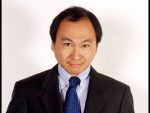
Name: Francis Fukuyama
Lived: 1952-
Nationality: American of Japanese heritage
Profession(s): Economist, political scientist, author
Books: The Soviet Union and the Third World: the Last Three Decades (ed., 1987), The End of History and the Last Man (1992)
Perspective: Liberal-conservative
Fukuyama was born to a Japanese-American family resident in Chicago. His grandfather was a veteran of the Russo-Japanese War (1905) who emigrated to the United States after leaving the military. Fukuyama studied liberal arts at Cornell University before transferring to undertake a politics degree at Harvard. He completed a doctorate there, specialising in Soviet-Middle East relations in the context of the Cold War.
In 1979, Fukuyama joined the RAND Corporation, a liberal-conservative thinktank that exerted considerable influence on Cold War policy. During the 1980s he served twice as an advisor to the US State Department, specialising in Middle-Eastern and European affairs.
Fukuyama suggested that with the demise of the Soviet Union, liberal democracy had triumphed over all other systems. According to Fukuyama, this marked the “end of history”, at least as far as ideological development: liberal-democracy had emerged as the best and final form of human government.
Fukuyama’s perspective, as might be expected, was firmly liberal-conservative. He viewed Soviet communism as a flawed system, capable of reaching a certain level of industrial-technical advancement but lacking the dynamism to compete with free-market economies and liberal societies. Fukuyama’s theory was popular on its release but has since fallen from favour, as neo-liberal capitalism has increasingly failed to meet the needs of its own people.
In recent years, Fukuyama has himself expressed concern about the erosion of democratic institutions and values, by leaders and parties seeking to maintain or expand their power.
Quotations
“A remarkable consensus regarding the legitimacy of liberal democracy as a system of government has emerged throughout the world over the past few years, as it conquered rival ideologies like hereditary monarchy, fascism and, most recently, communism.”
“What we are witnessing is not just the end of the Cold War, or a passing of a particular period of post-war history, but the end of history as such: that is, the end point of mankind’s ideological evolution and the universalisation of western liberal democracy as the final form of human government.”
“Understanding history in a conventional sense as the occurrence of events, people pointed to the fall of the Berlin Wall, the Chinese communist crackdown in Tiananmen Square and the Iraqi invasion of Kuwait as evidence that ‘history was continuing’ and I was ipso facto proven wrong. Yet what I suggested had come to an end was not the occurrence of events, even large or grave events, but History: that is, history understood as a single, coherent, evolutionary process.”
“Both Hegel and Marx believed that the evolution of human societies was not open-ended but would end when mankind had achieved a form of society that satisfied its deepest and most fundamental longings. Both thinkers thus posited an ‘end of history’. For Hegel, this was the liberal state, while for Marx it was a communist society. This did not mean that the natural cycle of birth, life and death would end, that important events would no longer happen… It meant, rather, that there would be no further progress in the development of underlying principles and institutions because all of the really big questions had been settled.”
“The experiences of the Soviet Union, China and other socialist countries indicate that while highly-centralised economies are sufficient to reach the level of industrialisation represented by Europe in the 1950s, they are woefully inadequate in creating… complex post-industrial economies in which information and technological innovation play a much larger role.”
“The totalitarian state hoped to remake Soviet man himself by changing the very structure of his beliefs and values through control of the press, education and propaganda. This extended down to a human being’s most personal and intimate relations, those of the family… [The goal of] totalitarianism: not simply to deprive the new Soviet man of his freedom, but to make him fear freedom in favour of security and to affirm the goodness of his chains, even in the absence of coercion.”
“Western confidence in the stability of Soviet communism rested on a belief, conscious or not, that the Russian people were not interested in or ready for democracy. Soviet rule, after all, was not imposed on the Russians by an external power in 1917… it had survived for six or seven decades after the Bolshevik Revolution, weathering famine, upheaval and invasion. This suggested that the system had won a certain degree of legitimacy among the broader population, and certainly within ruling elites, reflecting that society’s own natural inclinations toward authoritarianism.”
“Reagan’s Strategic Defence Initiative (SDI) posed a severe challenge [to the USSR] because it threatened to make obsolete an entire generation of Soviet nuclear weapons, and shifted superpower competition into areas like microelectronics and other innovative technologies where the Soviet Union had serious disadvantages.”
“The peaceful behaviour of democracies further suggests that the United States and other democracies have a long-term interest in preserving the sphere of democracy in the world, and in expanding it where possible and prudent. That is, if democracies do not fight one another, then a steadily expanding post-historical world will be more peaceful and prosperous.”
“Many people think that because we have advanced communications technology, and are able to project global television culture worldwide, this will lead to homogenisation on a deeper cultural level. I think that, in a way, it’s done just the opposite.”
With the exception of quotations, content on this page is © Alpha History 2018. This content may not be republished or distributed without permission. For more information please refer to our Terms of Use. This page was written by Jennifer Llewellyn and Steve Thompson. To reference this page, use the following citation:
J. Llewellyn & S. Thompson, “Historian: Francis Fukuyama”, Alpha History, accessed [today’s date], https://alphahistory.com/coldwar/historian-francis-fukuyama/.
